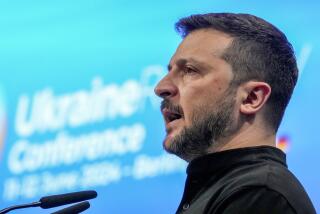Bonn Pledges Broad Help to Yeltsin : Germany: Kohl treats the Russian leader as a chief of state. The two vow industrial, economic and cultural cooperation.
- Share via
BONN — Russian Federation President Boris N. Yeltsin won broad pledges of German aid for his republic on Thursday as he met with Germany’s Chancellor Helmut Kohl to launch “a new era” of cooperation.
With police escorts, an honor guard and a military band playing his federation’s new anthem, Yeltsin received from Bonn the full protocol honors usually reserved for heads of state on an official visit.
Yeltsin said his four-hour talk with Kohl covered a broad range of issues and marked the beginning of closer relations “between the new Germany and the new Russia.”
Among other things, their joint agreement pledged cooperation in environmental, scientific, industrial, economic and cultural matters. It also laid the groundwork for German experts to help Russia build a market economy.
Yeltsin planned to meet with key politicians and business leaders, visit Daimler-Benz headquarters in Stuttgart and review Soviet troops in eastern Germany before ending his visit Saturday.
As president of the crumbling Soviet Union’s biggest and richest republic, Yeltsin is eager to lure foreign investors to help build a market economy in his nation.
Through cooperation, Germany and Russia, he said, “hold a powerful development potential.”
At the Foreign Ministry in Bonn, a spokesman agreed that investment, rather than cash handouts, offers the best chance for Russia’s long-term recovery. “We feel in particular that there’s a good chance for investment in the raw material sector in Russia, especially in oil and minerals,” said the official.
The 12-page cooperation agreement, which was signed on Yeltsin’s first official trip abroad since the failed Kremlin coup in August, underscored the new respect for him in the international arena. Germany is the Soviet Union’s biggest trading partner and most generous donor. Yeltsin’s rise in stature here is especially impressive since German unification would not have been possible without the blessing of Mikhail S. Gorbachev; Kohl feels particularly indebted and fiercely loyal toward the Soviet president, who is Yeltsin’s longtime rival.
Acknowledging Yeltsin’s role in foiling the coup in Moscow, Kohl lauded him as “a man who handled the historic hours in August with courage.”
Kohl promised that Germany would help Russia through the hardships of winter and economic reform, but he called on other Western nations to share the burden.
“We have not spoken about concrete sums,” Kohl told reporters after he and Yeltsin signed their pact. “Our Western partners are likewise called upon to rise to this tremendous challenge and do justice to their joint responsibility,” he added.
Germany, in turn, won Yeltsin’s support Thursday on two key issues: establishing an autonomous region for 2 million ethnic Germans, and returning ousted East German leader Erich Honecker to face criminal charges that he was involved in the killing of an estimated 200 people who died trying to flee across the deadly old East German frontier.
The latter issue caused a minor scene between Kohl and Yeltsin as they appeared on national television to sign their cooperation pact. Kohl ended his prepared remarks by promising eager German reporters that Yeltsin would address the issue of Honecker. Yeltsin then delivered his speech and walked away from the podium, only to get a stern look and what looked like a gentle nudge from Kohl.
With a bewildered backwards glance, Yeltsin obediently returned to the podium.
“The chancellor won’t let me go until I say something about Honecker,” he said with a sheepish smile. He then fell silent for a long moment.
“I’ll say something, I’ll say something,” he stalled.
Yeltsin then noted that he had assumed many of Gorbachev’s responsibilities lately, “but I’d rather leave this one to him.”
Nevertheless, he went on to reassert his intention to expel the aging Honecker from Russia. But he explained that Gorbachev, who opposes returning the former East German to Germany, could then simply send Honecker “to Kazakhstan, then to Uzbekistan and then he’d take the grand tour of all the republics.”
The mass-circulation daily newspaper Bild on Thursday said Honecker has appealed to Gorbachev for political asylum. “That is my last chance,” the unattributed report quoted Honecker as telling Gorbachev in a letter. “I will return to Germany only in a casket.”
Regarding the ethnic Germans, expelled from their Volga River settlements by Stalin in 1941, Yeltsin offered to give them a large former military exercise ground.
Bonn agreed in principle to help finance the resettlement, which it hopes will appease the Volga Germans and discourage them from exercising their constitutional right to emigrate to Germany.
Germany already plans to establish refugee camps beginning in January to help speed up a process of deportation and stem a flood of asylum-seekers, many of them from the former East Bloc.
More to Read
Sign up for Essential California
The most important California stories and recommendations in your inbox every morning.
You may occasionally receive promotional content from the Los Angeles Times.













